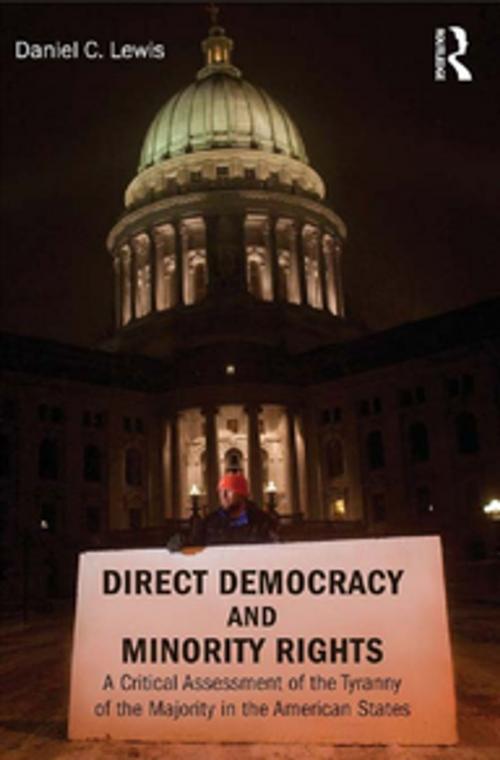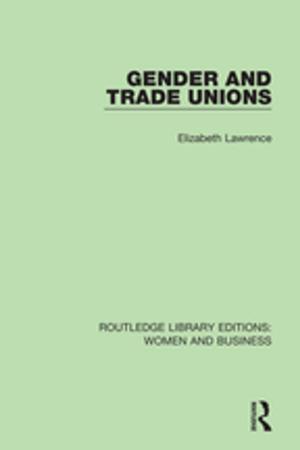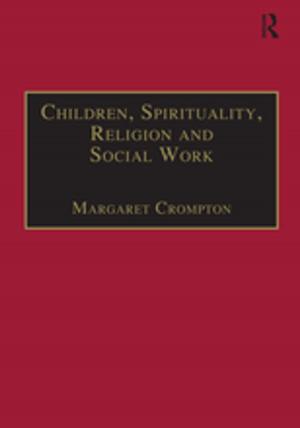Direct Democracy and Minority Rights
A Critical Assessment of the Tyranny of the Majority in the American States
Nonfiction, Social & Cultural Studies, Political Science| Author: | Daniel Lewis | ISBN: | 9781136269349 |
| Publisher: | Taylor and Francis | Publication: | January 4, 2013 |
| Imprint: | Routledge | Language: | English |
| Author: | Daniel Lewis |
| ISBN: | 9781136269349 |
| Publisher: | Taylor and Francis |
| Publication: | January 4, 2013 |
| Imprint: | Routledge |
| Language: | English |
This book conclusively demonstrates that direct democracy—institutions like the ballot initiative and the referendum—endangers the rights of minorities and perpetuates a tyranny of the majority. While advocates of direct democracy advocate that these institutions protect citizens from corrupt lawmakers beholden to special interests, Daniel Lewis’s thorough investigation shows how such mass participation exposes minority groups to negative policy outcomes favored by only a slim majority of voters. Some would argue that greater democratic responsiveness is a positive outcome, but without the checks and balances of a representative, separated powers system that encourages deliberation and minority representation, minority rights are at increased risk under direct democracy institutions.
While research has been presented that supports both sides of the debate, the existing literature has yet to produce consistent and compelling evidence in favor of one side or the other. This book undertakes a comprehensive examination of the "tyranny of the majority" critique of direct democracy by examining a host of contemporary American state policies that affect the rights of a variety of minority groups. By assessing the impact of direct democracy on both ballot measures and traditional legislation, the book provides a more complete picture of how citizen legislative institutions can affect minority rights, covering a myriad of contemporary (and sometimes controversial) minority rights issues, including same-sex marriage, affirmative action, official English, hate crimes laws, racial profiling, and anti-discrimination laws.
The book is unique in its approach and scope, making it compelling for scholars interested in direct democracy, state politics, minority politics and electoral institutions, as well as American politics generally.
This book conclusively demonstrates that direct democracy—institutions like the ballot initiative and the referendum—endangers the rights of minorities and perpetuates a tyranny of the majority. While advocates of direct democracy advocate that these institutions protect citizens from corrupt lawmakers beholden to special interests, Daniel Lewis’s thorough investigation shows how such mass participation exposes minority groups to negative policy outcomes favored by only a slim majority of voters. Some would argue that greater democratic responsiveness is a positive outcome, but without the checks and balances of a representative, separated powers system that encourages deliberation and minority representation, minority rights are at increased risk under direct democracy institutions.
While research has been presented that supports both sides of the debate, the existing literature has yet to produce consistent and compelling evidence in favor of one side or the other. This book undertakes a comprehensive examination of the "tyranny of the majority" critique of direct democracy by examining a host of contemporary American state policies that affect the rights of a variety of minority groups. By assessing the impact of direct democracy on both ballot measures and traditional legislation, the book provides a more complete picture of how citizen legislative institutions can affect minority rights, covering a myriad of contemporary (and sometimes controversial) minority rights issues, including same-sex marriage, affirmative action, official English, hate crimes laws, racial profiling, and anti-discrimination laws.
The book is unique in its approach and scope, making it compelling for scholars interested in direct democracy, state politics, minority politics and electoral institutions, as well as American politics generally.















